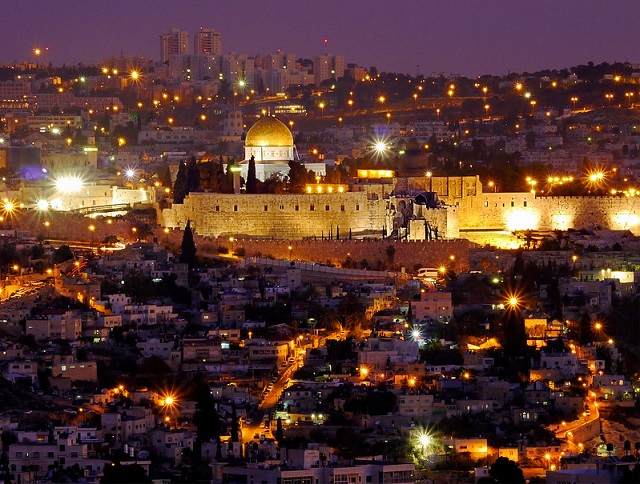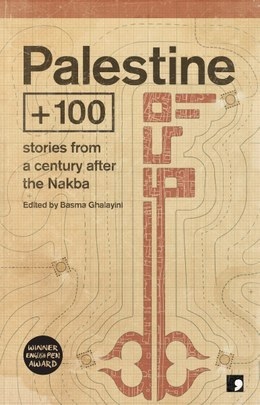Palestine +100: Stories from a century after the Nakba Books
Arts & Culture, Books, New in Ceasefire - Posted on Friday, November 15, 2019 11:25 - 0 Comments
By Asim Qureshi

Jerusalem at Night
Dome of the Rock and the Western Wall taken from Hass Promenade (Credit: Joiseyshowaa/Creative Commoms)
Those who know me know I have a particular penchant for science fiction, so imagine my surprise and delight at finding a newly published collection which imagines Palestine a hundred years after the 1948 Nakba (‘catastrophe’), all told through the lens of twelve incredible Palestinian sci-fi stories.
The dozen writers of these stories have done an incredible job of capturing the fears, hopes and dreams of their fellow Palestinians, reimagining them through incredible tales of fantastical technology and parallel universes.
From the introduction, the editor, Basma Ghalayini, sets the tone for the collection, reminding the reader that the Nakba was only begrudgingly accepted as being a quasi-permanent state of affairs by the Palestinian refugee community — and would come to embody their experiences through the creation of a worldwide diaspora. Being Palestinian, in other words, has always been linked to both the Nakba and the longing for Return:
“Palestinian refugees are, in this sense, like nomads travelling across a landscape of memory. They carry their village in their hearts, like an internal compass where ‘north’ is always Palestine. They pass this compass down to their children, who sketch in the details on an ever-fading map – the hills and trees and wadis – from their own imagination.” [p.viii]
This may be a sci-fi collection, but it is riddled with the deep scars of reality. In ‘A suicide in Gaza’, Saleem Haddad reminds us of three Palestinian boys killed on a beach, not too dissimilar to real events in the not too distant past — because even in fiction, Palestinians will never betray the experiences of their own. Whether it is within the realm of utopia or dystopia, Palestinians’ actual suffering is privileged above and beyond any desire for facile artistry.
I loved every story in this collection, not least because they aren’t always told from the perspectives of Palestinians, but at times offer those of Israelis, such as the ‘The Key’, written by Anwar Hamed, which leaves the reader with a sense of a future haunting those who engage in new forms of technological Apartheid. During my own travels in the West Bank, “the key” was such a powerful motif wherever I went. Hamed’s ghost story, of the haunted lives of Israelis who can never truly know peace as occupiers, is just the perfect ode to the spectre of Palestinian loss.
Emad el-Din Ayesha’s ‘Digital Nation’ brings into being the long-awaited Palestinian nation, even if it is through hacking the virtual reality headsets of Israelis. This act of historical subterfuge forces Israelis to confront the horrors of their own project, and the true extent to which the reality they have been taught is, in fact, a violent revision of true history:
“The Palestinians finally had a single government, free floating in a digital sea, with kids around the world learning from them and grappling passionately with their historical challenges. The game infected every console in Israel, and tracked its way to every player whose medical records showed Levantine blood (dated to 1948, including Jewish and Christian players, of course). The slogan that appeared on their screens as it downloaded read, ‘It’s time to come home.’” [p.89]
There are so many directions in which the plight of the Palestinian people can be raised that perhaps we take these framings for granted — due to our own reductive recasting of their experiences into very narrow registers of trauma. In ‘Application 39’, Ahmed Masoud forces us to consider the Palestinian condition beyond the usual tropes, by treating us to a morbidly clever story, in which Gaza attempts to host the Olympic Games:
“To pay a visit to this prison, Ismael thought; its first ever, in order to watch people running, jumping and throwing things!” [p.129]
There is no shortage of irony or cleverness in this collection. If anything, Palestinians have become experts in the deployment of these devices. The entire world, and history itself, have seemingly conspired against them. So when it comes to irony, there is sadly no shortage of material for them to draw upon.
 Crucially, the stories in the collection never lose sight of what it means to be Palestinian in the now, even when you are dragged into a Matrix-esque pseudo reality — the links to the present are viscerally there. The writing, with its persistent linking of the past to the present reminds us that for Palestinians, even in 2048, the Nakba will still be and feel, unshakably real:
Crucially, the stories in the collection never lose sight of what it means to be Palestinian in the now, even when you are dragged into a Matrix-esque pseudo reality — the links to the present are viscerally there. The writing, with its persistent linking of the past to the present reminds us that for Palestinians, even in 2048, the Nakba will still be and feel, unshakably real:
“Maybe the image travelled into his subconscious through his upbringing. It’s a bitch, that thing they call an upbringing. We’re only aware of the very end of its tail but its smooth slippery body stretches under our clothes and its head bites our children with poisonous memories, with images we spent a war and a lifetime trying to bury.” [p.44]
Palestine + 100
Edited by Basma Ghalayini
Featuring Talal Abu Shawish, Tasnim Abutabikh, Selma Dabbagh, Emad El-Din Aysha, Samir El-Youssef, Saleem Haddad, Anwar Hamed, Majd Kayyal, Mazen Maarouf, Abdalmuti Maqboul, Ahmed Masoud & Rawan Yaghi
Comma Press, August 2019



Leave a Reply